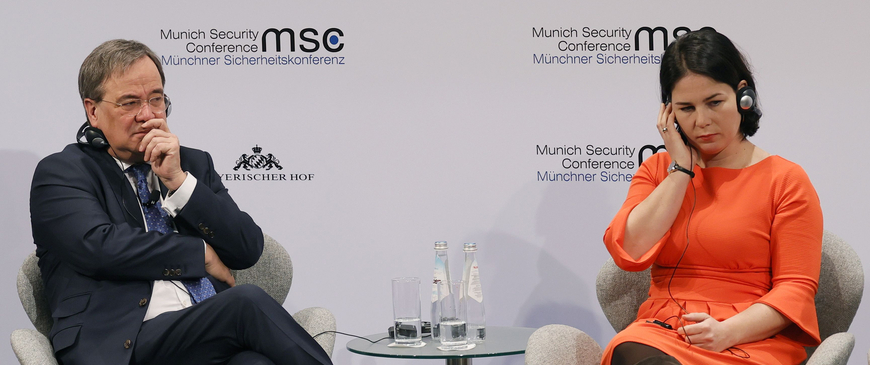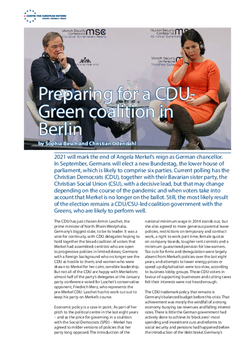
Preparing for a CDU-Green coalition in Berlin
Germany is often slow to adjust policies that have served it well. But the next election is one of the better opportunities to make progress.
2021 will mark the end of Angela Merkel’s reign as German chancellor. In September, Germans will elect a new Bundestag, the lower house of parliament, which is likely to comprise six parties. Current polling has the Christian Democrats (CDU), together with their Bavarian sister party, the Christian Social Union (CSU), with a decisive lead, but that may change depending on the course of the pandemic and when voters take into account that Merkel is no longer on the ballot. Still, the most likely result of the election remains a CDU/CSU-led coalition government with the Greens, who are likely to perform well.
The CDU has just chosen Armin Laschet, the prime minister of North Rhein-Westphalia, Germany’s biggest state, to be its leader. It was a vote for continuity, with CDU delegates hoping to hold together the broad coalition of voters that Merkel had assembled: centrists who are open to progressive policies in limited doses; Germans with a foreign background who no longer see the CDU as hostile to them; and women who were drawn to Merkel for her calm, sensible leadership. But not all of the CDU are happy with Merkelism: almost half of the party’s delegates at the January party conference voted for Laschet’s conservative opponent, Friedrich Merz, who represents the pre-Merkel CDU. Laschet has his work cut out to keep his party on Merkel’s course.
Economic policy is a case in point. As part of her pitch to the political centre in the last eight years – and as the price for governing in a coalition with the Social Democrats (SPD) – Merkel has agreed to milder versions of policies that her party long opposed. The introduction of the national minimum wage in 2014 stands out, but she also agreed to more generous parental leave policies, restrictions on temporary and contract work, a right to work part-time, female quotas on company boards, tougher rent controls and a minimum guaranteed pension for low-earners. Tax cuts for firms and deregulation were largely absent from Merkel’s policies over the last eight years, and attempts to lower energy prices or speed up digitalisation were too slow, according to business lobby groups. Those CDU voters in favour of supporting businesses and cutting taxes felt their interests were not heard enough.
The CDU trademark policy that remains is Germany’s balanced budget, but Laschetmay be more open to fiscal changes after the election.
The CDU trademark policy that remains is Germany’s balanced budget before this crisis. That achievement was mostly the windfall of a strong economy buoying tax revenues and falling interest rates. There is little the German government had actively done to achieve its ‘black zero’: most spending and investment cuts and reforms to social security and pensions had happened before the introduction of the ‘debt brake’, Germany’s constitutional fiscal rule, in 2009. But the CDU was more than happy to take the credit, and portrays itself as the architect and guardian of Germany’s fiscal strength. In the process, the debt brake and adherence to fiscal rules have acquired a totemic importance to the party.
Is that bad news for Europe? For now, Laschet has to protect the CDU’s fiscal legacy if he is to placate the right wing of his party. One of Merkel’s close aides, Helge Braun, recently wrote a sensible op-ed suggesting that the debt brake be softened for a time after crises, but his proposal was brutally shot down by CDU members. The party will continue to resist any attempts to soften fiscal rules before the elections and will surely campaign to return to the black zero. But the CDU may be more open to fiscal changes after the election. The public is in favour of more investment and no longer sees public debt as a major issue. The Greens will come into any coalition talks confident about their manifesto ideas, one of which is to make the debt brake less dogmatic and friendlier to investment, while preserving long-term fiscal sustainability.
What is more, sticking slavishly to the debt brake is not cost free: if more debt is ruled out, the CDU will have to come up with other plans to plug the fiscal gap. Pension or welfare cuts would not go down well, and nor would lower investment, let alone higher taxes. The CDU could thus need an elegant way to avoid such distributional debates. It may be time once more for the CDU ‘to Merkel’, that is, to quietly abandon a position formerly held dear because the consensus and political reality have changed. The Greens would be right to use the leverage they have in the coalition talks to pressure the CDU into changing its views.
Domestic reconsideration of the debt brake may also soften Germany’s stance in Europe. The CDU will have to come to terms with the idea that re-imposing fiscal discipline will take longer. The EU’s rules, which are currently suspended, mandate that countries with debt levels above 60 per cent of GDP reduce it by 1/20th per year. That is very fast, if not downright impossible, for countries with high debt levels, and has not been applied strictly in the past. But the European Commission did demand tax hikes and spending cuts that would at least improve the debt trajectory. It would be a mistake for Europe to return to its fiscal rules any time soon, as it would risk choking off a fragile recovery from the pandemic. A change of heart in Germany would give the Commission more political leeway to interpret the rules liberally.
Defence policy does not yet have the same totemic importance for the CDU as fiscal orthodoxy. But if the Greens were to form a coalition with the CDU, the SPD would make sure the topic plays a larger role in the public debate than before, in the hope of exploiting the naïve pacificism and status quo complacency that still dominates much of the German debate on defence.
Germany’s allies have long complained about its unwillingness to take on greater responsibility for Europe’s security. Berlin, faced with multiple crises in the EU’s neighbourhood and under pressure from Washington, has increased military spending and been active in discussions on strategic renewal in NATO and the EU. For example, Berlin has launched the EU's Strategic Compass process, which aims to foster a shared understanding of threats facing the EU and how to respond to them. But between the CDU’s comfortable attachment to US protection and the SPD’s dovish position on Russia, the defence policy of the current grand coalition has not changed much in recent years.
The Greens, born from the pacifist movements of the 1970s, have not suddenly become hawks. They oppose NATO’s goal of spending 2 per cent of GDP on defence, demand a more restrictive arms exports policy, are sceptical of military deployments, and want Germany to sign the UN treaty banning nuclear weapons, which would mean the withdrawal of US nuclear weapons from Germany and thus the end of Germany’s participation in NATO’s nuclear sharing arrangement.
The Greens havenot suddenly become hawks, but they are politically hawkish, for example on authoritarian regimes like China.
But the Greens are politically hawkish, for example on authoritarian regimes in Russia, China and Turkey, led by a focus on human rights and a belief that Europe should promote peace and liberal values. They want a stronger UN, and a stronger EU foreign and security policy. They have also overcome much of their traditional NATO scepticism, and realise that to fulfil international commitments, the Bundeswehr needs to be properly equipped. Their pragmatism on defence questions is the result of substantial debates within the party. The Greens’ openness to discuss security matters could reinvigorate defence policy at a federal level, too, making Germany more willing to contribute to European defence policy and be tougher on China. Germany is not the fastest at adapting policies that have served it well to a new environment. But the next election is one of the better opportunities to make progress.
Sophia Besch is a senior research fellow and Christian Odendahl is chief economist at the Centre for European Reform.

